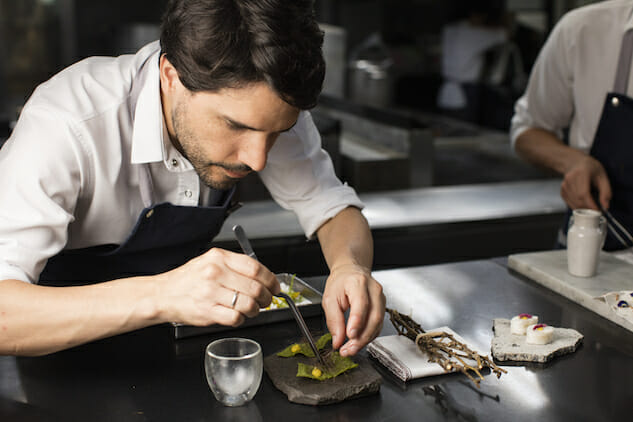Beyond Food Porn: Chef’s Table‘s New Season Won’t Just Make You Hungry
…It’ll make you think
Rene Funk/Netflix TV Reviews Chef's Table
If you’re already a loyal viewer of Netflix’s documentary series Chef’s Table, you can expect more of the same-with some detours into even more eclectic territory. Newcomers, brace yourselves for a docuseries that might really change the way you look at what you eat. And why.
Each episode is a standalone documentary and each highlights the personal journey of a different chef. I’m going to start with a quibble: Many episodes feel like they run long, and I think that’s the fault of repetitive imagery and information. In two of the four Season Three episodes I watched, I found myself frustrated by information I wished they were giving me instead of that 83rd walk-through of someone’s kitchen or one more close-up of the mise en place. (Whoa, that guy is foraging in the Amazon for ingredients no one has experienced before, and he just up and stuck that mushroom in his mouth. How did he know it was OK to eat?) The ultimate focus is on the chef—not the food, not the restaurant—and sometimes you can get the measure of a chef (artiste, ascetic, mystic, activist; bully, den-mother, iconoclast, egomaniac) in a few shots. After that, you need to delve. Sometimes in these episodes the dives are a tad shallow. But as I say, it’s a quibble, not a fatal flaw.
This show is freaking beautiful. Each episode is a gorgeously filmed, extremely thoughtful look at one chef, probably but not always at the helm of a hotshot restaurant, and how and why he or she got there. It follows a very standard documentary model: Chef in natural habitat, succulent close-ups of ridiculously pretty food, chef taking about childhood or mentors or philosophy, spliced-in commentary by some kind of expert or family member or cohort.
But there’s something about it. The photography is absolutely beuatiful, and the scope is decidedly global and hugely diverse, and it’s intimate, which food should always be. Any one episode is interesting and a joy to look at. One chef builds ecosystems on his plates, for example concocting dishes to evoke the sea that not only use marine ingredients but are presented to look like a rock that someone pulled out of a tidepool. (They are spectacular.) Another manages to evoke the power of humility and compassion simply by arranging a lotus blossom to float in a bowl of tea. One wants to challenge and provoke; one’s happiest making grilled cheese sandwiches for a clutch of happy regulars on the other side of the bar. All unique. All remarkable.
Watching them in sequence unfolds a nuanced, multi-layered glimpse into the through lines that seem to thread themselves into the lives of chefs, and “control freak” isn’t the primary one. What’s brought into sharp focus is a sense that each of these people, surrounded by families and communities and friends and patrons, is someone with a fundamental sense of being alone. In Season Three, that’s expressed by the wild diversity of the profiled makers, who include a sort of food-cartographer (you’ll see what I mean), a reformed thug, a cult bread expert and a Buddhist monk. Their art (or craft) might be informed by a philosophy, a raging curiosity, a religious code, a passion for environmental justice, or any number of things. But there’s a moment in every episode where the chef describes being or feeling totally alone. I confess, I think about food a lot, and I had never thought about it that way. But it makes sense. Food is a fundamental connective tissue of life on this planet and it’s a fundamental defining element of communities. Of course it would attract people with a lonely streak. We are always seeking connection and fellowship, and eating together is one of the main ways we do it. Being the person who provides that experience is powerful.
The airwaves are jammed with programs about food, cooking and, especially, chefs and chefdom. The phenomenon of the celebrity chef is fairly recent, and we eat it up, pun intended. Sometimes I wonder if Julia Child would have set a foot in front of a television camera had she been able to look into the future and see Gordon Ramsey bellowing like a deranged despot at humiliated line cooks. We have any number of programs about food: documentaries, competitions and everything in between. It’s easy to believe no one could possibly have anything new to… um, bring to the table.
One of these episodes singlehandedly revived my flagging interest in repairing my garden. Another actually made me cry. All of them made me want more.
Season Three of Chef’s Table debuts today on Netflix.